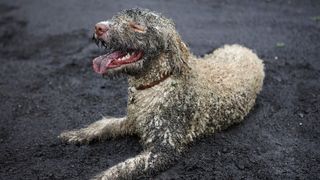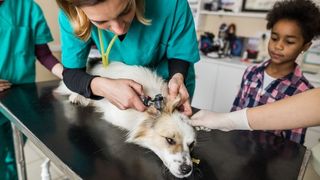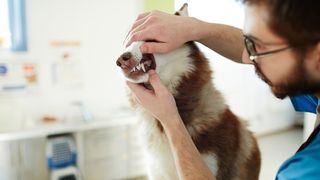Why does my dog smell? Find out what’s causing that unpleasant odor
Wondering “why does my dog smell?” He may be suffering from one of these malodorous maladies

The answer to the question “Why does my dog smell?” could be simple. After all, they love to roll in stinky things, play in the mud, and just get downright dirty. But sometimes the problem can’t be solved with even the best dog shampoo.
Sometimes a dog smells bad for reasons more serious than just a bit of dirt and grime. Odors that are yeasty, fishy, or otherwise foul can all be symptoms of an underlying health problem.
Not only can this spell trouble for your dog, but those pervasive odors can be detrimental to your bond with your canine companion, too. If your pup smells bad, don’t banish him to the dog house!
To help you get to the bottom of the problem, here are the five most common reasons why your dog may smell bad.
1. Skin infections
Dermatologic conditions are the most common causes of bad odor, and they’re the number one reason why dogs are brought to the veterinary clinic. If your dog is experiencing a skin infection, you may notice symptoms like:
- A yeasty or musty odor
- Scratching
- Hair loss
- Frequent licking
- Rashes
- Red, inflamed ears or skin
Skin infections like hot spots are common in thick-coated dogs, especially in warm weather after swimming or bathing. Other dogs may be more prone to developing skin infections due to other underlying conditions such as allergies, hormone imbalances, or parasites.
If you suspect your dog may have a skin infection, it’s important to see your veterinarian so these underlying causes can be diagnosed and appropriately addressed. In most cases, treating the infection will resolve the bad body odor. It might also be worth taking a look at some of the best dog food for allergies.
- Best dog nail clippers: Give your pooch the perfect pedicure
- Best puppy food: Great nutrition for healthy, growing dogs
- Is dry dog food best?
- Why do dogs yawn?
2. Ear infections
Ear infections in dogs are a common problem, especially in warm weather. Ear infections can be quite the nuisance. Some dogs, like the Basset Hound, may be more prone to them due to their big floppy ears which hold in moisture. Other dogs may pick up excess moisture from swimming or bathing, and still others may develop chronic ear infections secondary to allergies.
Ear infections are often easy to spot – look for signs such as shaking the head, scratching the ears, dark wax or moist discharge, and a bad odor. Untreated ear infections are painful and can cause permanent damage to the ear, so it’s important to seek professional help when you notice these symptoms. If your dog swims or gets baths frequently, ask your veterinarian for a good maintenance cleaner to help prevent infections caused by residual water in the ears.

3. Anal gland problems
If your dog has ever been diagnosed with anal gland issue, then you’re probably all too familiar with this characteristic foul smell. The anal glands are a pair of small sacs located just inside the anus at the 4 o’clock and 8 o’clock positions. When your dog defecates, these sacs naturally secrete a fluid with a characteristic fishy smell. Sometimes this fluid may also be released if your pup gets stressed or frightened – a smell many pet owners have unfortunately experienced at home! If the openings to the anal sacs become blocked, the fluid can’t be released and the sacs may begin to swell and become uncomfortable or even infected.
Signs that your dog has an anal gland problem include a fishy smell, frequent licking of the anus, scooting or rubbing the area on the ground, and discharge from the anus. The anal glands can even rupture if left untreated, leaving a smelly mess in their wake. If you notice these symptoms in your dog, it’s best to see your veterinarian to have this malodorous problem addressed. Some dogs may need to have their anal glands expressed manually on a regular basis in order to prevent foul odors and discomfort.
4. Digestive disorders
Many digestive disorders can lead to a host of smelly symptoms. Symptoms like bad breath, vomiting, flatulence, and diarrhea can all be caused by an underlying digestive problem and will undoubtedly make your pup smell bad. Some conditions, like a simple upset stomach, may resolve on their own or may be fixed by changing your dog’s diet, for instance choosing dog treats for sensitive stomachs. But other digestive problems – like food allergies, inflammatory bowel disease, parasites, or gastroesophageal reflux – are more serious and may require medical intervention. If your dog’s symptoms don’t resolve within 24-48 hours, it’s best to see your veterinarian for an examination to assess the problem.
5. Dental disease
Dental disease is unfortunately very common in pets and some sources estimate that over 80% of dogs over the age of three are affected. One of the first symptoms of dental disease pet owners notice at home is stinky dog breath! Unfortunately, that rotten breath often does not appear until the dental disease is quite severe. Other signs of significant dental disease can include pawing at the mouth, drooling, difficulty eating hard foods, inflamed gums, and a preference for chewing only on one side of the mouth. However, many pets with dental disease never show any symptoms, which is why it’s so important to see your veterinarian for regular wellness examinations.
Once dental disease develops, the only way to address it is to put your pet under anesthesia for a professional dental cleaning. If the dental disease is severe, your pet may also need to have some teeth removed. These treatments will typically resolve your pet’s bad breath and make your pet feel much more comfortable. You can prevent dental disease at home by learning how to brush a dog’s teeth with a pet-specific toothpaste every day. If your dog won’t tolerate brushing, ask your veterinarian about other dental care products like water additives, dental chews, and special dental diets.

What to do if your dog smells
If your dog smells, you may be tempted to try home remedies and over the counter treatments first to see if this resolves the issue. However, it is recommended that you avoid these types of treatments for your dog’s health and safety. Many over the counter treatments and home remedies are not safe for your dog and may make the condition even worse. Similarly, avoid bathing your dog with human shampoos or bath products. These products are not balanced for a dog’s skin pH and can cause dryness, itching, flaking, and possibly worsening of the odor. Although it can be tough to wait it out with a stinky dog, seeing your veterinarian first is the best thing you can do. Never give your dog any home remedies, over the counter treatments, supplements, or products intended for humans without first consulting your veterinarian for advice.
If you notice a new or unpleasant odor on your dog, the first thing you should do is make an appointment with your veterinarian. Your veterinarian will perform a full head to tail physical examination on your dog, and may recommend some diagnostic testing such as taking some skin samples, running blood work, or taking radiographs (x-rays) if needed. Once the underlying cause of your dog’s bad odor has been diagnosed, your veterinarian will be able to prescribe appropriate treatment to help get your dog back on track. Be sure to follow your veterinarian’s instructions closely and return to the clinic for any recheck or follow up examinations your vet recommends. In most cases, with treatment your dog’s odor should improve or even resolve, so you can get back to snuggling with your dog – without the foul smells!
Bad odor is nothing to sniff at!
Although there are lots of jokes about dogs being smelly, any odor that can’t be fixed with a good bath is a potential cause for concern. Many medical conditions can cause a foul odor, and some of them can be serious for your pet. Any change in your pet’s smell should be discussed with your veterinarian. Fortunately, in many cases the bad odor will resolve once the underlying problem is addressed. Hopefully your pup will smell fresh again in no time!
PetsRadar Newsletter
Get the best advice, tips and top tech for your beloved Pets
Dr. Elizabeth Racine is a small animal general practice veterinarian covering all things pet health and wellness. Her special interests include veterinary behavior, nutrition, and internal medicine. As a freelance writer, Dr. Racine has written content for major companies in the industry such as the American Kennel Club, Merck Animal Health, Bayer PetBasics, Elanco, and CareCredit. In her free time, Dr. Racine enjoys playing trampoline dodgeball, hiking with her beagle Dasher, and spending time with her three mischievous cats. Dr. Racine can be found at www.theveterinarywriter.com and at https://www.linkedin.com/in/eracinedvm/

